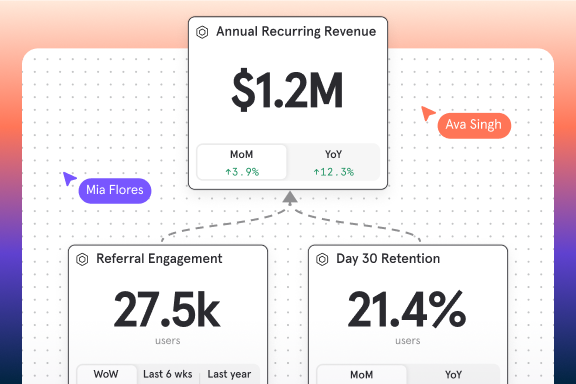How Yelp reduced its data analysis cycle time from weeks to days using Mixpanel
Company
Yelp connects people with great local businesses. With unmatched local business information, photos and review content, Yelp provides a one-stop local platform for consumers to discover, connect and transact with local businesses of all sizes by making it easy to request a quote, join a waitlist or make a reservation, and make an appointment or purchase. Yelp was founded in San Francisco in 2004.
Challenge
Manually doing product analytics was time-consuming and slowed down Yelp’s product decision-making process.
Solution
Mixpanel + Yelp’s internal logging platform delivered better insights faster, helping the team make more informed product decisions for its customers and advertisers.
Results
- Reduced the time it took to conduct product analysis from weeks down to a few days
- Decreased the time between ideation and launch for critical features
- Unlocked ideas on product discovery and improvement
- Supported analytics users across Yelp at scale
Mixpanel is the ‘intuition pump’ for our product team. It enables our product managers and designers to uncover and focus on larger opportunities for product discovery and improvement.Angela Sun Sr. Product Manager, Data Products, Yelp
How they did it
How does your team contribute to the overall success of Yelp?
Yelp’s core data platform team owns the data products that downstream data consumers use to do analytics work. We work with the product and engineering verticals to build the data platforms and data products that empower the business to make data-driven decisions, as well as to power the Yelp product with data and Machine Learning (ML) models. We support data science in the development and improvement of our in-house experimentation platform and provide them with the data they need to do experimentation, analysis, and statistical products.
What were you using for data analytics prior to Mixpanel?
We used other third-party tools in the past, as well as support from our analysts within business operations, strategy, and data science. Together, they provided answers to product analytics questions that were needed for feature development and for Product Managers (PMs) to learn the behaviors of their product better. We also used our own internal logging software development kit (SDK).
Tell us about Yelp’s needs that led to exploring a new solution.
With our past analytics resources, we uncovered three needs that were not fully fulfilled:
- Need to better understand user behavior in order to make more informed product decisions
- Need to actively monitor and iterate on the product strategy based on actual adoption and usage patterns after feature launches
- A desire for more self-serve, data-informed insights to improve and accelerate iteration cycles and feedback loops.
What were you looking for in a new solution provider, and why did you select Mixpanel?
In 2020, Yelp valiantly emerged from the pandemic stronger and leaner than ever. To continue its momentum, the company was ready to double-down on investing in solutions that would help drive future success.
Therefore, we put together the proposal to invest in a product analytics vendor. We ran a company-wide production proof-of-concept comparing Mixpanel to several other vendors in the product analytics space. We looked at many factors, including scalability, ease of use, breadth/depth of analytics capabilities, and response times. When we did this market scan, we found Mixpanel to be one of the leaders in the space. Our product, marketing and analyst community teams who were engaged in the evaluation process determined that Mixpanel was a better choice amongst the compared players for our needs due to these reasons:
- Speed: Mixpanel was relatively quicker in terms of time to insight, turnaround time to get answers, and the least amount of clicks to get there. This was unanimous across our evaluators in recognizing Mixpanel to be the simplest and strongest tool in this category.
- Ease of use: Our team found that Mixpanel had a mature handle on the fundamentals of product analytics. Furthermore, we discovered that Mixpanel had an intuitive nature of the visualizations and maturity of the visualizations in bringing above the fold the most relevant results, as well as the easiest way to interact and slice and dice those results.
- Tech stack integration: From a technical standpoint, Mixpanel allowed us to easily integrate with our in-house logging platform which made it easy to plug into our existing data and get up and running in a relatively short time span.
Furthermore, the Mixpanel team was great to work with through POC. Mixpanel entertained our ability to use our actual data in our POC to create a very relevant and compelling set of demos and user sessions. This allowed our intended user base to get a really good idea of what the experience would be like using data that was familiar to them.
What has the feedback been about Mixpanel so far?
Mixpanel is on track to be widely adopted across product teams at Yelp. Our PMs have been able to gain insights from the analyses they’re doing on their own in Mixpanel, and this is driving new inquiries in new product and feature developments based on insights that were previously unknown to them.
Two examples of this:
- Mixpanel has helped our Local Business team continuously understand user behavior and unlock areas for improvement within the product, which allowed us to enhance our business listing claim process.
- We’ve released new multi-location dashboard features last year. Our design team needs to understand usage patterns to iterate on our design solutions. Mixpanel was able to allow them to easily understand usage patterns of our multi-location advertising dashboard to iterate on their designs.
What are the top benefits that you’re seeing with your usage of Mixpanel?
Mixpanel has begun producing results for our business and is decreasing the time between ideation and launch for critical features and product improvements/enhancements.
We’ve reaped these benefits in the past year of using Mixpanel:
- Speed and ease of use. There is significant time-saving in our team’s daily workflow. In addition, smaller teams are able to answer questions about their product areas without requiring the support of data analysts.
- Many PMs have incorporated Mixpanel directly into product enhancement proposals, which is where they generate hypotheses and ultimately launch experiments and projects. We also love the fact that Mixpanel allows users to zero in on the most relevant events for their particular inquiry or analysis.
- We are generating new insights and enabling a whole new level of data exploration. We are using Mixpanel to ask questions we would never have asked before and our PMs are finding answers to those questions, which allows us to focus on larger opportunities and areas that we know will pay off.
- We’re seeing a shift in how data is presented internally. Many PMs now present their ideas using Mixpanel dashboards instead of Tableau or charts manually built in Excel during product reviews and executive meetings.
Mixpanel is a valuable analytics partner that helps our teams at Yelp make more informed product decisions for our customers and advertisers.Sid Arora Head of Data Products - Analytics and Experimentation, Yelp
How does Mixpanel fit into your larger tech stack with BI platforms and other systems?
Mixpanel is a complement to our BI platforms. The BI platforms will continuously excel at transactional data reporting, reporting that needs to cross domains or systems with no time series data, and tabular or other financial or core descriptive analytics reporting. Mixpanel is a complement because it’s the “intuition pump.” It is key at the ideation phase, at the hypothesis generation phase, and for iterating fast on questions, thoughts, and ideas. It gives us a sense in a short amount of time of the opportunity size—the size of the impact—to help PMs evaluate the trade-offs of multiple product initiatives and make more informed product decisions.
How integral is it to have a product analytics tool?
Having a product analytics tool is necessary for our PMs to be effective at their work. To use an analogy: In the world of golf, you need to have a golf club to be effective. In the world of product management, you need to have a product analytics solution, which is the golf club to a golfer.
What advice would you give to others looking at a product analytics tool?
It’s important to involve the people that are the intended users of the system as early in the process as possible. Find a small group of enthusiastic users who will provide relevant feedback based on their real life use cases and daily workflows. These users will help you build the business case by explaining why it would be a valuable decision to invest in product analytics. And then when you roll it out, you have early buy-in from these users who are already vested and advocates of the new solution.
What’s next for Yelp using Mixpanel?
Coming out of the pandemic, Yelp’s growth is led by product and innovation in order to better address customer needs and support local businesses as they get back to business as usual. That requires very personalized experiences and a focus on the different needs from advertisers across multiple segments and consumers of all kinds. We’re planning to grow our use of Mixpanel to run smarter experiments, conduct more analyses, and identify new product opportunities. For Yelp, Mixpanel is a key platform that is helping us supercharge the investments we’re making to make better product decisions faster, and for Yelp to continue to be the first choice for people looking to connect with great local businesses.
Mixpanel helps us make better product decisions faster, supercharging the investments we’re making. That ultimately helps Yelp to continue to be the first choice for people looking to connect with great local businesses.Sid Arora Head of Data Products - Analytics and Experimentation, Yelp
Thousands of companies use Mixpanel to build better products. See what Mixpanel can do for your team. Create your free account today.

